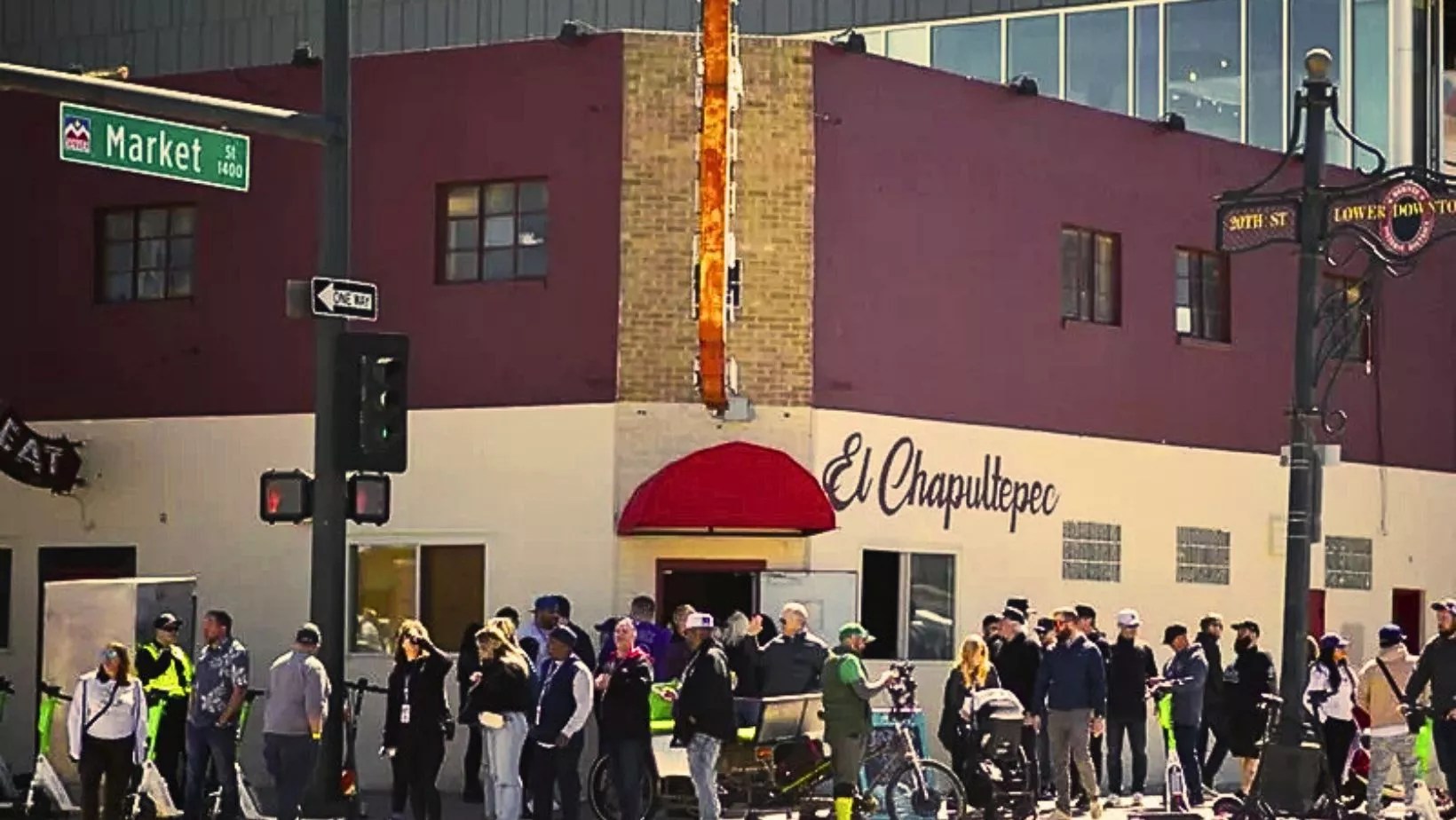
Evan Semón Photography

Audio By Carbonatix
At its finest, live music is a joy to behold – and the setting where it’s produced can enhance a listener’s experience immeasurably. The right artists making the right sounds in the right place are capable of creating memories that last a lifetime.
Lucky thing, because many of Denver’s most incredible live-music venues have shuffled off this mortal coil. But the beautiful noise made within their walls continues to linger, and bars with live music as well as jazz and blues spots still continue to thrive here.
During the middle decades of the twentieth century, scads of joints specializing in jazz came and went. Take Sonny’s Lounge, which once could be found at 23rd and Curtis; a Denver Public Library post shows an ad for a 1957 “Summer Jazz Festival” whose bill included Art Blakey and the Jazz Messengers and quartets led by Miles Davis and Chet Baker. My kingdom for a time machine!
The rock scene was blessed by just as many great nightspots. The Family Dog debuted on September 8, 1967, and subsequently played host to a slew of seminal acts, including Jimi Hendrix, Janis Joplin, the Grateful Dead and more. But the Dog was put down in less than two years, and while its 1601 West Evans Avenue building still exists, the business currently operating there is PT’s Showclub Denver, a strip joint whose performers specialize in baring their bodies instead of their rock-and-roll souls. The Rainbow Music Hall, active at 6360 East Evans from 1979-1989, hosted performers as varied as AC/DC and Tom Waits before being transformed into a Walgreens. And Ebbets Field, on the street level of Brooks Tower at 1020 15th Street, managed to squeeze in gigs by everyone from Billy Joel to Lynyrd Skynyrd during its brief 1973-1977 existence.
For this rundown on bygone venues, we focus on more recent losses. Some were showplaces. Others were dumps. But they all contributed mightily to Denver music. Read about them below:
Cricket on the Hill
1209 East 13th Avenue
From 1963 until March 2008, Cricket on the Hill was a musical mainstay in Denver – and over those 45 years, it never put on airs. The Cricket was among the least pretentious live-music staples ever, and everyone was welcome.
As music historian Tom Murphy pointed out in this space, the club “hosted bands of pretty much every conceivable genre and level of notoriety. Denver’s godfathers of noise Page 27 played there – so did nearly every other band in town over the years. It wasn’t fancy, although the sound system, when properly operated, was better than you would guess.”
As a bonus, Murphy stressed that “if you played and people showed up and drank, you got paid. Which is more than can be said of many other venues.”
Eck’s Saloon
9890 West Girton Drive, Lakewood
Eck’s Saloon will once and forever be associated with rock. Hard, heavy, hot rock made by hairy men whose flyaway manes kept Aqua Net in profits for generations, and who were devoted enough to their chosen profession to keep plugging away long after headlining at arenas gave way to appearances at the likes of this modest but irresistibly fun Lakewood watering hole.
Concert Archives’ roster of Eck’s Saloon shows begins with a 2006 appearance by L.A. Guns, a band that almost but didn’t quite give Guns N’ Roses a run for its bullets. Others who graced Eck’s include W.A.S.P., Drowning Pool, Firehouse, Warrant, Michael Schenker of UFO and Denver’s own Kip Winger, who performed both with his namesake band and in a solo acoustic mode. Because it’s possible to rock even without electricity!
Despite the appeal of its specialty, Eck’s hit tough times after a few years. The Saloon’s still active X account announced in 2013 that it was “Now Under New Management!!! Still The Old Bar You All Know And Love Just Revamped With New Male/Female Bartenders, New Big Flat Screen TV’s.” But by January 2015, it was all over but the power chords, and more’s the pity.
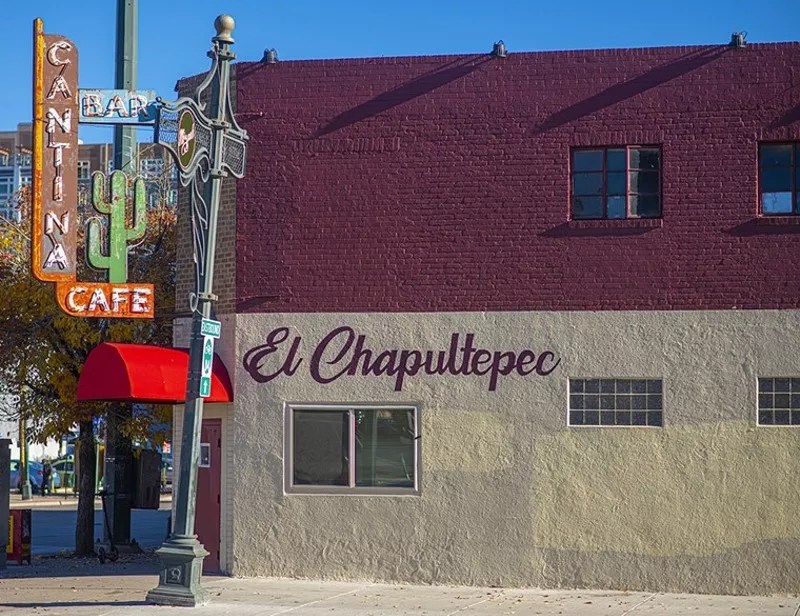
El Chapultepec was a local landmark with an international reputation for jazz.
Evan Semón Photography
El Chapultepec
1962 Market Street
If Denver’s jazz scene can be likened to a solar system, El Chapultepec was the sun around which everything else revolved – which explains why the Pec and its longtime owner, Jerry Krantz, were inducted into the Colorado Music Hall of Fame last year.
The place was hardly posh. Indeed, Denver saxophonist Freddy Rodriguez Sr., my wife’s great uncle, who led the nightclub’s house band for decades, lovingly dubbed it a dive – and its signature burritos definitely didn’t qualify as gourmet fare. But at its height, the nightspot nurtured Colorado’s finest jazz and blues players – and pretty much any nationally known performer passing through Denver made it a point to stop by to perform or pay homage to one of the state’s great cultural institutions.
The El Chapultepec story began in 1933. Back then, Mattie’s House of Mirrors, a popular brothel, was two doors down and freight-train tracks were only about twenty feet away from the front entrance. As late as the 1980s, the Pec had to close at midnight on Sundays to prevent its tipplers from being flattened by a regularly scheduled locomotive.
Nonetheless, El Chapultepec won the affection of a loyal clientele – mostly working-class folks attracted by reasonably priced booze, cheap eats and live mariachi bands. One such person was Jack Kerouac, an author who captured the zeitgeist with the 1957 publication of On the Road, based on his travels earlier that decade. Denver readers have long debated whether an unnamed drinking den depicted in the book was El Chapultepec. Krantz didn’t know for sure, but he said Kerouac would sometimes sleep in cars in a vacant lot adjacent to the club and often bellied up to the bar – but he tended not to stay long, since there was a drink minimum and he was usually broke.
After Krantz switched the musical focus from Latin sounds to jazz, other luminaries began dropping by: Frank Sinatra, Ella Fitzgerald, the Marsalis brothers. Even Bill Clinton visited before his run for U.S. president and wanted to return after he was elected, only to have the Secret Service nix the notion.
Still, being famous didn’t mean special treatment, as two members of U2 discovered when they showed up at the club with a couple of females Krantz suspected of being underage. The owner had no idea who the rockers were and promptly gave them the heave-ho.
Krantz passed away in 2012, but the club kept going until 2020, when the pandemic took the life of Rodriguez – he was among the first Coloradans to die of COVID-19 – and forced a shutdown that turned out to be permanent. A double tragedy.
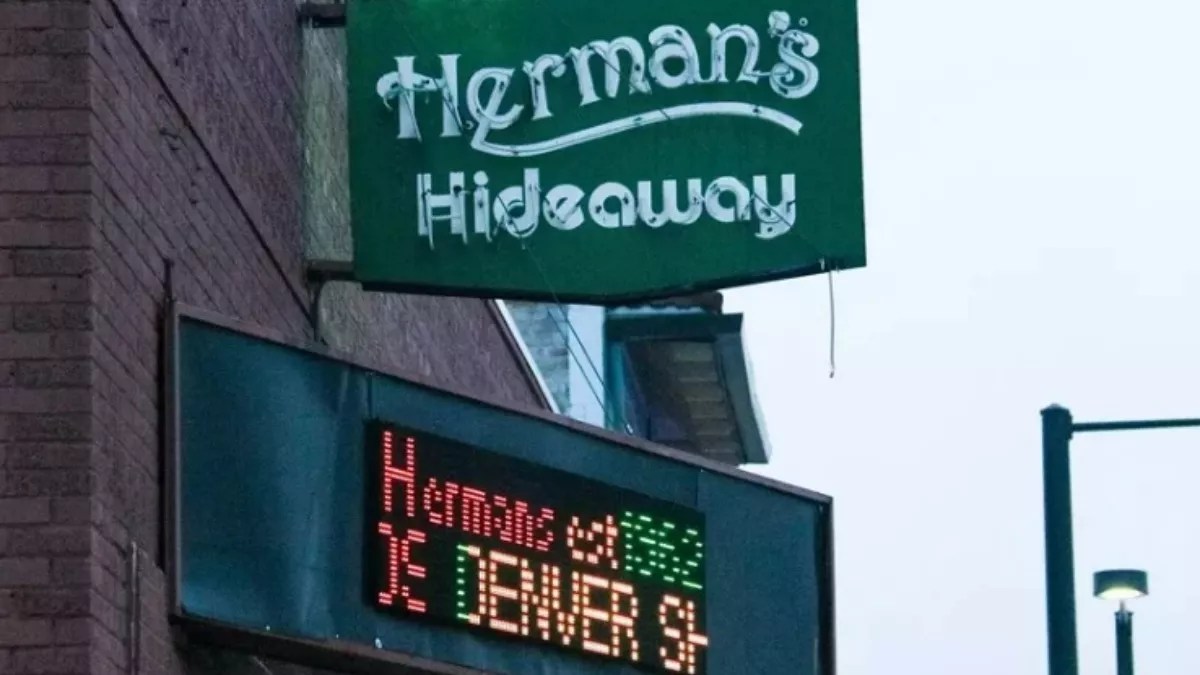
The sign over the entrance to Herman’s Hideaway.
Herman’s Hideaway Facebook page via Westword
Herman’s Hideaway
1578 South Broadway
Herman’s Hideaway was a family affair. As recapped in a 2024 Westword profile, Herman Roth launched the club in the early 1960s before handing off its management to his son, Allan – and Allan did likewise to his own boy, Mike. But the chain would have no more Roth links. Last summer, Mike revealed on the Herman’s Hideaway Facebook page that the club would become Coco Bongos, a Latin dance spot.
“Over the last 65 years we have been blessed to serve Denver and S. Broadway with over 40,000 bands/sets,” Mike wrote, “and we’re excited to see what happens in the future.”
The Hideaway’s past will be tough to top. During Allan’s heyday, he booked loads of acts that subsequently graduated to national fame and fortune, including Dave Matthews, Phish, Blues Traveler and Widespread Panic. Numerous local bands also used Herman’s as a launchpad – most notably Big Head Todd and the Monsters. For other groups, playing at the roomy, party-centric club was the highlight of their careers – and no doubt one they look back upon fondly.
Monkey Mania
50 North Lipan Street and 2126 Arapahoe Street
The great ape of Denver DIY pads, Monkey Mania got its start in 1998 at 50 North Lipan Street before moving to the former Arapahoe Warehouse, which had previously been the nesting spot for the excellent combo Twice Wilted. Over the next seven years or so, the Mania was spread to fans of Colorado acts at home in the musical underground as well as touring collectives that didn’t mind getting down and dirty: Sonic Youth, Wolf Eyes, the Microphones, the Coachwhips.
In a Westword tribute, writer Tom Murphy neatly summed up the venue’s appeal.
“It was a cross-section of the music and the community that made the place special and significant and still has a place in the hearts of anyone that got to experience one of the many great shows at Monkey Mania and its spirit of openness, creativity and taking chances with art,” Murphy allowed. “You could see noise shows at Monkey Mania. You could also see indie pop, punk, metal, unclassifiable music, pop, performance art – anything outside the mainstream.”
Adventure awaited anyone willing to Monkey around.

The stage of Paris on the Platte.
Photo by Brandon Marshall
Paris on the Platte
1553 Platte Street
Denver has a great tradition of folk clubs. Think of the Exodus, 1999 Lincoln Street, which in the late 1950s and early 1960s offered a warm and cozy spot to hear the likes of Josh White, Oscar Brand and the boffo double bill of Judy Collins with the Smothers Brothers.
Paris on the Platte didn’t tend to attract names that big. It was mainly a coffeehouse, the kind of noshery that was as much about the ambiance as the piping hot brews. But its appeal was boosted by acoustic performers whose strumming made hanging out for hours feel not just comforting but essential.
A 2013 post offers a sense of the vibe. “Matt Hoffman singing solo! Amazing!” it read, adding, “9 p.m. Never a cover, just the hat.”
Unfortunately, this throwback sensibility eventually succumbed to changes wrought by the modern age. In January 2015, Paris on the Platte closed after nearly thirty years in business, only to reopen one last time the next month for a “nostalgia sale” at which customers could purchase pieces of the place that had meant so much to them over the years.
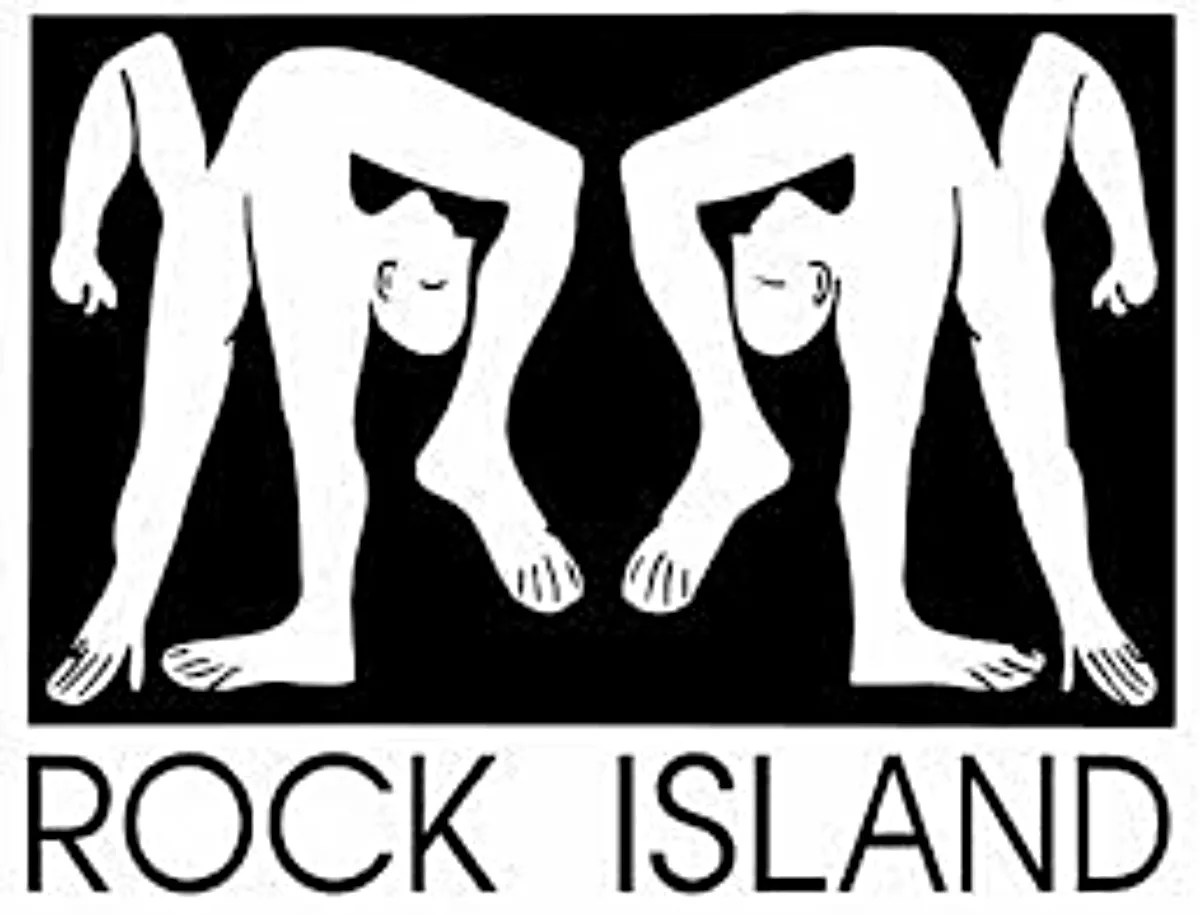
The logo for Rock Island.
Westword
Rock Island
1614 15th Street
In an October 2006 piece for Westword, Tuyet Nguyen wrote, “Rock Island is not closing. Read that again: Rock Island is not closing. Cut it out and tape it to the fridge, because Rock Island owner David Clamage does not want to repeat himself.”
If that sentence is still affixed to your freezer, feel free to remove it. Rock Island was supposed to be shutting down only temporarily for what was termed a “massive overhaul.” Over three years later, the club’s website was still promising “We’ll be back,” but by then, an office occupied its former home – and Rock Island never returned.
When the venue opened on 15th Street in 1986, the neighborhood was a long way from upscale, and that was appropriate, since Rock Island was interested in providing an alternative to glossy nightspots. Emblematic of the acts that played there in its first phase was Skinny Puppy, purveyor of industrial bangers, and provocative groups such as 808 State, Die Warzau, Primal Scream, Lush, MC 900 Ft. Jesus and the Flaming Lips arrived shortly thereafter.
Remaining on the musical cutting edge over the long haul can be tough, but Rock Island managed, inviting My Chemical Romance to its stage in 2004, a good two years before The Black Parade sent the band to the mainstream. But as LoDo became a hipster destination, neighbors began complaining that the venue was bringing what Nguyen dubbed “an unsavory crowd” to the area.
Somehow, this description doesn’t strike me, a member of said crowd, as insulting in the slightest.
23 Parrish/The Garage
2301 Blake Street
From the 1980s to the 2000s, as Westword‘s Jon Solomon noted, several clubs operated at 2301 Blake Street – among them Gate 12, Polly Esther’s, Club 303 and the Blake Street Tavern, whose name was subsequently tweaked to its current iteration, The Tavern on Blake Street. But arguably the space’s most storied period was the half-decade or so when it was known as 23 Parrish, The Garage or both.
The name switchbacks undoubtedly gave copy editors nightmares – but the bands booked into the sprawling, ultra-trendy venue during the period when Michael Lustig was in charge more than made up for the pain. During and immediately after the rise of grunge, Denver tastemakers got a chance to get up close and personal with Nirvana, Smashing Pumpkins, Jane’s Addiction and plenty of other genre-defining bands. The music was so rich and vital that new ground seemed to be broken on a nightly basis.
Note: At a 1991 show starring the Buzzcocks, I unwisely chose to slam-dance while wearing a long wool coat and lost its matching cinch-belt in the process. If anyone still has it, I’d really like it back.
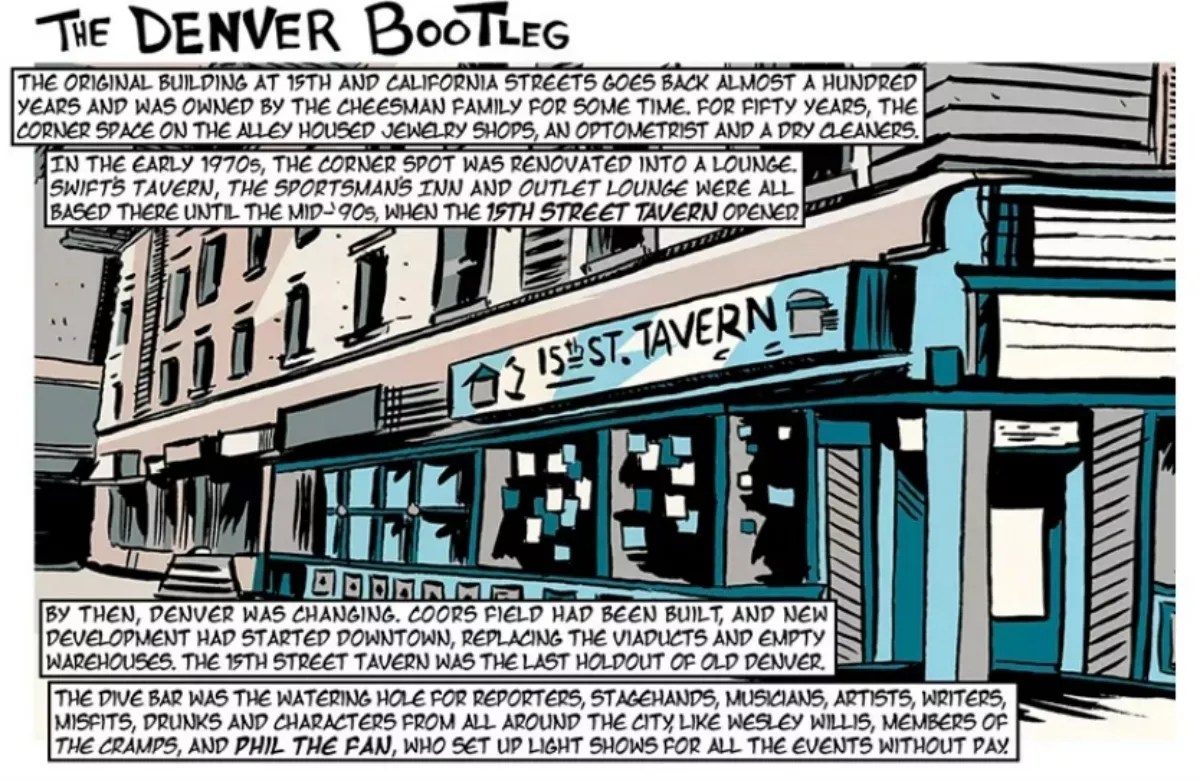
An illustrated tribute to the 15th Street Tavern.
Illustration by Karl Christian Krumpholz via Westword
15th Street Tavern
623 15th Street
In 1997, a country bar was reimagined as the 15th Street Tavern, and thanks to Scott Campbell, who’d later go on to launch the still-alive-and-kicking Larimer Lounge, it quickly earned a reputation for booking acts before anyone realized they were the Next Big Thing.
The Tavern’s page on the indispensable Concert Archives website tells the tale in vivid detail, documenting gigs by the Shins, the Murder City Devils, Death Cab for Cutie and System of a Down – and it’s by no means complete. The venue hosted the album-release bash for Neutral Milk Hotel’s An Aeroplane Over the Sea, an event that has cemented its cool factor forever.
The club’s ambiance was ably summed up in this space by Thorin Klosowski in a 2010 remembrance. “Ah, the dearly departed Tavern: It was covered in posters that appeared to be blocking holes in the wall,” Klosowski said. “And who can forget the pinball table? Covered in beer most nights, it was a welcome retreat when an opening act failed to catch my interest. Then there was the graffiti green walls, which assaulted the senses as much as the smell of urine, but the floors, coated in vomit and booze offered the most tactile of feelings. It was like walking into a bubble gum factory after an explosion. In short, it was the epitome of a punk-rock venue. Even the bartenders evoked the spirit of the place – surly but polite, punk rock but capable.”
If only they could pour us another one right now….
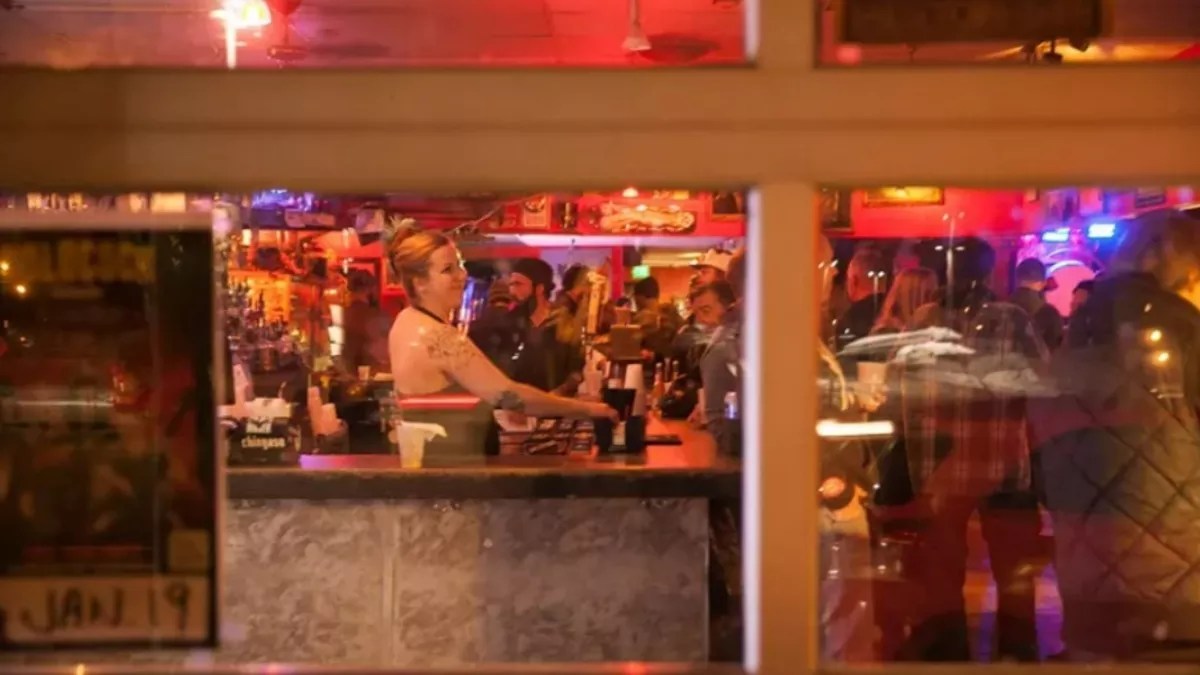
Inside the late, lamented 3 Kings Tavern.
Photo by Brandon Marshall
3 Kings Tavern
60 South Broadway
Another club killed by the COVID-19 pandemic, 3 Kings Tavern gave up the ghost a couple of months into the lockdown. In May 2020, owner Marty Killorin told Westword that he’d gotten behind on rent when business came to a standstill. “I could come out of pocket to pay it, but it’s kind of like throwing good money after bad,” he maintained. “These things happen.”
True enough – and Killorin and company certainly made the most of the fourteen years 3 Kings Tavern lasted. The club’s Concert Archives lists boasts an impressive 280 dates, and although its bookends – the roster starts in February 2006 with Cephalic Carnage and concludes in January 2020 with Hail Satan – suggests a proclivity for darkness, the acts in between are an eclectic lot. Drag the River, These Arms are Snakes, Dale Watson, Jesse Dayton, Nashville Pussy and the Bastard Sons of Johnny Cash represent music from all over the map, and that’s an excellent thing.
After the closure news broke, fans weighed in on social media. Here’s a sampling of their responses:
Congratulations on a historic run!
Saw some AMAZING shows there over the years, all kinds of genres. A sad loss for Denver venues. It had the dive bar appeal without actually being a dive, it was nicer than that. RIP.
Well, that sucks ass. So many awesome metal shows at that spot. Damn.
Such a great venue for local bands like mine to be able to play…you treated us like rock stars, and that green room was awesome. Thank you and thank you.
Long live the King!
I couldn’t have said it better myself.